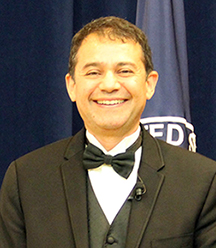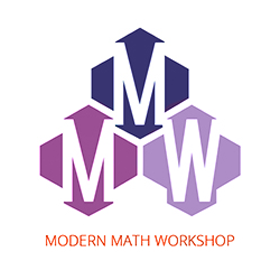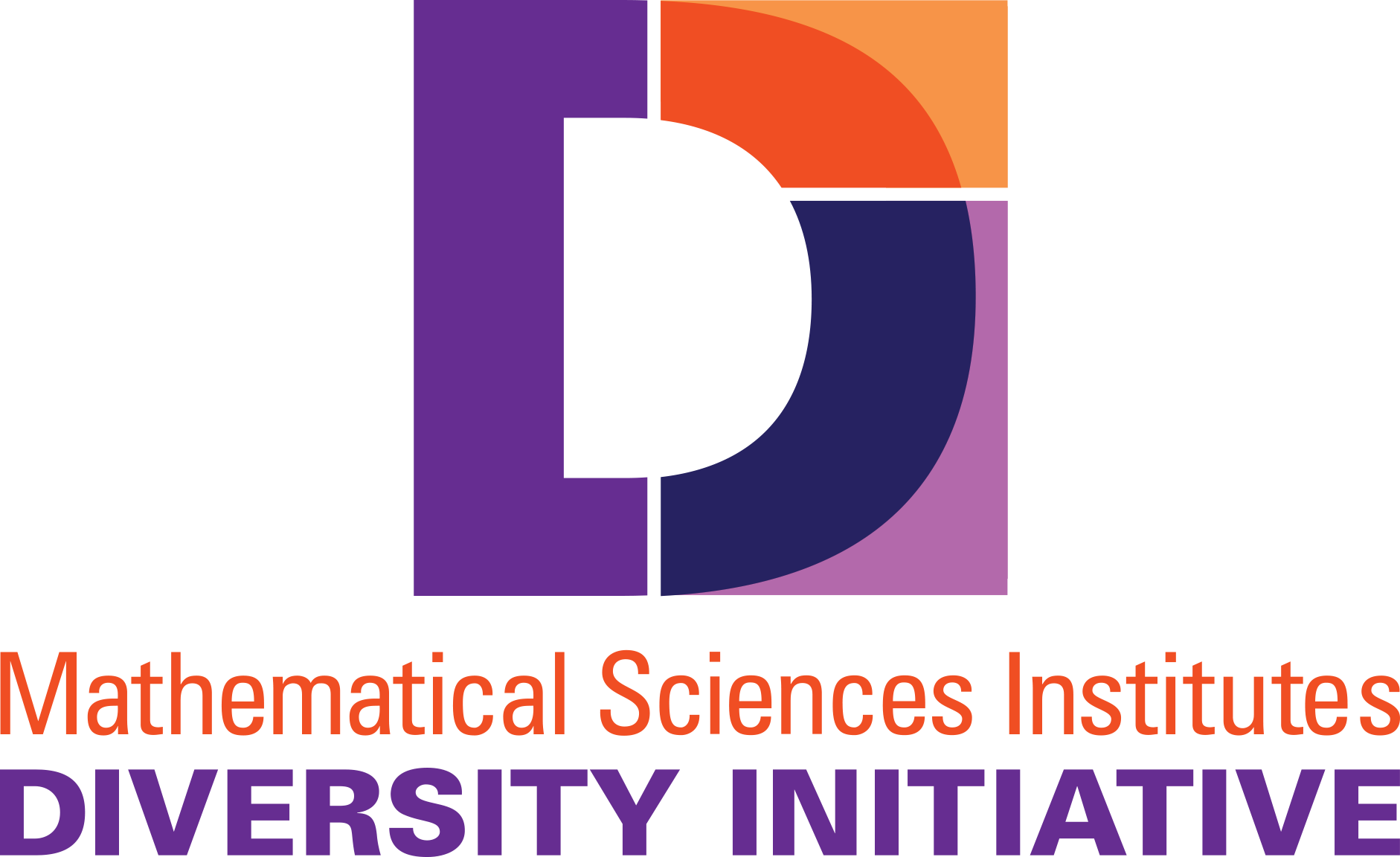Organizing Committee
- Hélène Barcelo
MSRI - Leslie McClure
SAMSI - Christian Ratsch
IPAM - Ulrica Wilson
Morehouse College
Abstract
The Mathematical Sciences Diversity Initiative is pleased to announce the 2017 Modern Math Workshop at SACNAS. This workshop is intended to encourage undergraduates, graduate students and recent PhDs from underrepresented minority groups to pursue careers in the mathematical sciences and build research and mentoring networks.
The Modern Math Workshop is a "pre-conference" part of the SACNAS National Conference. Both the Modern Math Workshop and the SACNAS conference take place in the Salt Palace Convention Center in Salt Lake City, Utah. The Modern Math Workshop check-in/registration begins at noon on Wednesday, October 18, with the scientific programming beginning at 1:00pm. The final session, a Q&A with NSF Math Institute representatives, ends at noon on Thursday, October 19.
- Research Sessions: The intended audience is graduate students and recent PhDs. Each participating institute will provide a speaker who will present an upcoming research program at the respective institute. All presentations will be expository in nature, intended for mathematical scientists and students not necessarily working in these areas but interested in learning about new developments and the possibility of spending some time at one of the Math Institutes. Due to the diverse portfolio of the institutes, it exposes participants to a broad range of topics in modern mathematics. These sessions run over the two days of the Modern Math Workshop: 1:00-4:30pm on the afternoon of Wednesday, October 18, and 9:00-10:45am the morning of Thursday, October 19.
- Mini-courses: Two half-day mini-courses will be offered on October 18, from 1:30-4:30pm, running concurrently: "Polynomial exact sequences in numerical analysis" and "Counting curves, intersections, and designs in hyperbolic geometry". These mini-courses are intended for undergraduate students.
- Keynote Speaker: At 4:30pm on Wednesday, October 18, all Modern Math Workshop participants are invited to enjoy the keynote lecture by Jesus De Loera (UC Davis), "The little theorem that could: How Sperner’s coloring lemma influenced Mathematics & Economics". Dr. De Loera's research encompasses a large number of pure and applied projects, including his work in Convexity and Combinatorial Commutative Algebra, as well as his work in Combinatorial Optimization and Algorithms.
- Reception: The NSF math institutes' networking reception will immediately follow the keynote lecture at 5:30pm on Wednesday, October 18. This reception is sponsored by Brown University's Department of Math, Department of Applied Math and The Office of Institutional Diversity and Inclusion
- Q&A: The closing session of the workshop is a Q&A with NSF Math Institute representatives, 11:30am-12:00pm on Thursday, October 19.
Workshop Details
- Research Sessions
- The intended audience is graduate students and recent PhDs. Each participating institute will provide a speaker who will present an upcoming research program at the respective institute. All presentations will be expository in nature, intended for mathematical scientists and students not necessarily working in these areas but interested in learning about new developments and the possibility of spending some time at one of the Math Institutes. Due to the diverse portfolio of the institutes, it exposes participants to a broad range of topics in modern mathematics. These sessions run over the two days of the Modern Math Workshop: 1:00-4:30pm on the afternoon of Wednesday, October 18, and 9:00-10:45am the morning of Thursday, October 19.
- Mini-courses
- Two half-day mini-courses will be offered on October 18, from 1:30-4:30pm, running concurrently: "Polynomial exact sequences in numerical analysis" and "Counting curves, intersections, and designs in hyperbolic geometry". These mini-courses are intended for undergraduate students.
- Reception
- The NSF math institutes' networking reception will immediately follow the keynote lecture at 5:30pm on Wednesday, October 18. This reception is sponsored by Brown University's Department of Math, Department of Applied Math and The Office of Institutional Diversity and Inclusion.
- Q&A
- The closing session of the workshop is a Q&A with NSF Math Institute representatives, 11:30am-12:00pm on Thursday, October 19.
Keynote Lecture
The little theorem that could: How Sperner's coloring lemma influenced Mathematics & Economics
Jesús De Loera, University of California, DavisAbstract
Sperner's lemma states that a certain way of coloring triangulations of an n-dimensional simplex must contains at least one cell colored with a complete set of n colors. This simple result has nevertheless great depth as it is equivalent to Brouwer's fixed point theorem and it has strong connections to Borsuk-Ulam theorem and other classical results in topology.
Sperner's lemma has many applications too: it has been used for computation of fixed points, in root-finding algorithms, in fair division (cake cutting, rental agreements) algorithms and it is at the foundation of the proofs of existence of Nash equilibria in Game theory. Several fascinating variations have been discovered and applied in recent years and there is renewed interest by theoretical computer scientists to find algorithmic versions. In my talk I will convince a non-expert why everyone should know about this lovely easy-to-understand, yet powerful, mathematical result.
About the Speaker
Jesús De Loera is a Professor of Mathematics at UC Davis. His work includes over 80 papers and books in Convex Geometry, Combinatorics, Algebra, Algorithms and Optimization. He received an Alexander von Humboldt Fellowship in 2004 and the 2010 INFORMS computer society prize. He is a fellow of the American Mathematical Society since 2014.
For his mentoring and teaching he received the 2013 UC Davis Chancellor's award for mentoring undergraduate research and, in 2017, the Mathematical Association of America Golden Section Award. He has supervised eleven Ph.D students, and over 50 undergraduates research projects. He is an associate editor for 'SIAM Journal of Discrete Mathematics' and 'SIAM journal of Applied Algebra and Geometry'.

University of California, Davis
Confirmed Speakers & Participants
Talks will be presented virtually or in-person as indicated in the schedule below.
- Speaker
- Poster Presenter
- Attendee
- Virtual Attendee
-
Amy Adair
Louisiana State University
-
Anna Albano Luzardo
California State University Long Beach
-
Malachi Alexander
California State University, Monterey Bay
-
Tarik Aougab
Brown University
-
Federico Ardila
San Francisco State University
-
Hélène Barcelo
MSRI
-
Marily Barron
University of California, Merced
-
Davina Boykin
Valparaiso University
-
Jaysha Camacho
University of Florida
-
Charles Camacho
Oregon State University
-
Alexandria Cervantes
California State University Monterey Bay
-
Anastasia Chavez
MSRI
-
Vickie Chen
California State University, Channel Islands
-
Jung Colen
Penn State University
-
Regina Cruz
California State University Channel Islands
-
Jeshu Dastidar
Queens College, CUNY
-
Adriana Dawes
MBI
-
Jesús De Loera
UC Davis
-
Ashley De Luna
California State Polytechnic University
-
Jessica De Silva
University of Nebraska - Lincoln
-
Keiko Dow
D'Youville College
-
Michelle Dow
University of California San Diego
-
Sabrina Enriquez
University of Southern California
-
Ayoub Falah
Hochschule für Technik Stuttgart
-
Beatrice Francois
Medgar Evers College
-
Joel Gallegos
San Francisco State University
-
Edray Goins
Purdue University
-
Miriam Goldman
Arizona State University
-
Mikayla Grace
University of Vermont
-
Johnny Guzman
Brown University
-
Trajan Hammonds
Carnegie Mellon University
-
Maria Hernandez
California State University Monterey Bay
-
Nathalie Huerta
University of California Channel Islands
-
Kenan Ince
Rice University
-
Johnson Jeremy
Humboldt State University
-
Caleb Ji
Washington University in St. Louis
-
John Jimenez
College of the Sequoias
-
Harold Jimenez Polo
University of California, Berkeley
-
Chris Johnson
University of Utah
-
Chris Kwan
Georgia Institute of Technology
-
Suzanne Lenhart
NIMBioS-University of Tennessee
-
Rodrigo Leon-Prato
University of Puerto Rico-Mayaguez
-
Wei-Cheng Lin
University of Pennsylvania
-
Jesus Lopez
Central Washington University
-
Jaaziel Lopez de la Luz
University of Puerto Rico
-
Ruth Lopez Fajardo
University of Puerto Rico
-
Megan Ly
University of Colorado Boulder
-
Esteban Madrigal
Harvard College
-
Christine Marshall
MSRI
-
Maria Martinez
martinez@math.berkeley.edu
-
Sue McDonald
SAMSI
-
Christian McRoberts
Morehouse College
-
Andres Mejia
Bard College
-
Juan Mendoza
Central Washington University
-
Gabriele Montoya-Vega
University of Puerto Rico, Mayaguez
-
Adriana Ortiz Aquino
University of Puerto Rico, Rio Piedras
-
Carlos Osco Huaricapcha
San Francisco State University
-
Tyler Owen
California State University, Channel Islands
-
Ricardo Palafox
California State University, Fullerton
-
Catherine Paolucci
NSF Division of Mathematical Sciences
-
Angela Patini
University of Pennsylvania
-
Viviana Peña Márquez
Konrad Lorenz University
-
Amy Prager
MIT alumna/Saudi Research Science Institute
-
Ryan Pugh
California State University, Monterey Bay
-
Chrystabelle Ramirez
University of California, Berkeley
-
Angel Ramos
California State University Channel Islands
-
Christian Ratsch
IPAM
-
Thomas Rechtman
University of Central Florida
-
Tristan Reynoso
University of Central Florida
-
Hwayeon Ryu
University of Hartford
-
Omkar Sakhawalkar
Carnegie Mellon University
-
Christian Sampson
SAMSI
-
Carlos Samuels
Medgar Evers College
-
George Santellano
San Francisco State University
-
Diana Sernas
University of California, Santa Cruz
-
Diljit Singh
CUNY Hunter College
-
Bianca Sosnovski
Queensborough Community College, CUNY
-
Kaitlin Tademy
Sam Houston State University
-
Kaisa Taipale
Cornell University
-
Diane Tchuindjo
University of Maryland, College Park
-
Samuel Torres Sáez
University of Puerto Rico at Mayaguez
-
Trang Tran
Student
-
Jason Turner
Union College
-
Oyita Udiani
NIMBioS
-
Olivia Vasquez
Central Washington University
-
William Velez
The University of Arizona
-
Ricardo Villa Virrey
Arizona State University
-
Valeria Villegas-Medina
Westminster College
-
Andres Vindas Melendez
University of California, Berkeley
-
Mina Vora
East Georgia College
-
Talitha Washington
Howard University
-
Greg Wiggins
NIMBioS-University of Tennessee
-
Ulrica Wilson
Morehouse College
-
Carmen Wright
Jackson State University
-
Yuniba Yagues
San Diego City College
-
Destine Zuniga
Rio Hondo College
Workshop Schedule
Wednesday, October 18, 2017
| Time | Event | Location | Materials |
|---|---|---|---|
| 12:00 - 1:00pm EDT | Registration/Check-In | Salt Palace Convention Center (150 D-G) | |
| 1:00 - 2:30pm EDT | Undergraduate Mini-Course 1: Polynomial exact sequences in numerical analysis - Johnny Guzman, Brown University | 151 D-F | |
| 1:00 - 2:30pm EDT | Undergraduate Mini-Course 2: Counting curves, intersections, and designs in hyperbolic geometry - Tarik Aougab, Brown University | 151 A-C | |
| 1:00 - 1:40pm EDT | Mathematics for Sea Ice and Climate - Christian Sampson, SAMSI | 150 A-C | |
| 1:45 - 2:25pm EDT | Science at Extreme Scales: Where Big Data Meets Large Scale Computing - Chris Johnson, IPAM | 150 A-C | |
| 2:30 - 2:45pm EDT | Coffee Break | Outside of 150 A-C | |
| 2:45 - 4:10pm EDT | Undergraduate Mini-Course 1: Polynomial exact sequences in numerical analysis - Johnny Guzman, Brown University | 151 D-F | |
| 2:45 - 4:10pm EDT | Undergraduate Mini-Course 2: Counting curves, intersections, and designs in hyperbolic geometry - Tarik Aougab, Brown University | 151 A-C | |
| 2:45 - 3:25pm EDT | Using Mathematics to Address Problems in Biology and Medicine - Adriana Dawes, MBI | 150 A-C | |
| 3:30 - 4:10pm EDT | Analyzing trade-offs between tactics for grass-roots advocacy in a dual-belief social network - Oyita Udiani, NIMBioS | 150 A-C | |
| 4:30 - 5:30pm EDT | Keynote Lecture: The little theorem that could: How Sperner’s coloring lemma influenced Mathematics & Economics - Jesus De Loera, UC Davis | 150 D-G | |
| 5:30 - 6:30pm EDT | Modern Math Workshop Reception | 151 G |
Thursday, October 19, 2017
| Time | Event | Location | Materials |
|---|---|---|---|
| 9:00 - 9:40am EDT | Polytopes and Positroids - Anastasia Chaves, MSRI | 150 A-C | |
| 9:45 - 10:25am EDT | Exploring symmetric spaces of SL(n,k) where k is a finite field - Carmen Wright, ICERM | 150 A-C | |
| 10:30 - 10:45am EDT | Coffee Break | Outside of 150 A-C | |
| 10:45 - 11:25am EDT | Bases for cohomology of the affine Grassmannian - Kaisa Taipale, IAS | 150 A-C | |
| 11:30 - 12:30pm EDT | Q&A with Institute Representatives | 150 A-C |


